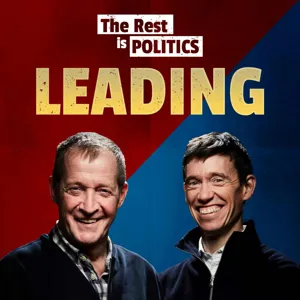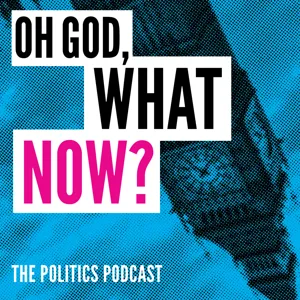Podcast Summary
Comparing Leaders Based on Style vs. Substance: When evaluating political leaders or potential hires, focus on both style and substance to make informed decisions.
It's essential to consider both style and substance when evaluating political leaders, as they can sometimes be quite different. Boris Johnson serves as a recent example, as he was often compared to populist leaders despite having distinctly different policies. This confusion between style and substance has continued with the current political landscape, with some comparing Keir Starmer and Rishi Sunak based on their styles rather than their policies. While similarities in style may exist, it's crucial to remember that substance and policy positions hold significant importance. In hiring, LinkedIn can be an invaluable resource, providing access to professionals who may not be actively seeking new opportunities but could be open to the right role. And for Mother's Day, Blue Nile offers a wide selection of stunning jewelry, with most items available for overnight shipping and free returns. Don't miss their special deals for significant savings on beautiful trends.
Political Figures of Our Time: Policies, Style, and Institutions: Boris Johnson's engaging speech style and ability to connect with large audiences differ from Trump and Farage's divisive policies and disregard for institutions, but Johnson also shows disregard for political norms.
Boris Johnson's political style, which includes adaptability, charisma, and a large following, should not be confused with the anti-politics or populist policies of figures like Trump or Farage. While Johnson may not have pursued divisive policies like his counterparts, his engaging speech style and ability to connect with large audiences are distinct from the institutions and respect for political norms that have long defined British politics. The third component is the disregard for political norms and institutions, which was exemplified by Trump's actions in America and can be seen in Johnson's attempts to bypass parliament and attacks on the judiciary. These three aspects - policies, style, and institutions - help distinguish the political figures of our time.
Rishi Sunak and Keir Starmer's Different Political Outlooks: Both Rishi Sunak and Keir Starmer present as mild-mannered and managerial politicians, but they have distinct substance and approaches to politics. Debating institutions and constitutional change is crucial, and it doesn't make one anti-politics or populist.
Despite their similar appearances and presentable demeanor, Rishi Sunak and Keir Starmer hold significant differences in their political outlooks and attitudes towards institutions. While both are seen as mild-mannered and managerial politicians, they have distinct substance and approaches to politics. The discussion also touched upon the role of institutions in politics and the importance of debating them, as well as the potential for constitutional change. The recent Rwanda debate was highlighted as an example of a broader context for such discussions. It's important to remember that challenging institutions and debating constitutional change does not equate to being anti-politics or populist.
Distinct Factions in the Tory Right: The Tory right in the UK Conservative Party consists of diverse factions, each with unique philosophies and priorities, including the ERG, Common Sense Group, Conservative Growth Group, New Conservatives, and Northern Research Group, affecting Brexit and other policies.
The Tory right in the UK Conservative Party is not a monolithic entity, but rather a collection of distinct factions with varying philosophies and priorities. These include the European Research Group (ERG), the Common Sense Group, the Conservative Growth Group, the New Conservatives, and the Northern Research Group. While they all share a Brexity outlook, they differ significantly on issues such as immigration, culture wars, economic policies, and social spending. It's essential to recognize these distinctions to understand the complex dynamics within the party and its potential implications for Brexit and other policy areas.
Brexit Years: UK Conservative Party's Internal Divisions and Influence of Farage's Brexit Party: The Conservative Party in the UK is currently divided into several factions, with the right wing being the most contentious. Nigel Farage's Brexit Party continues to exert significant influence over the Conservative Party despite not holding any parliamentary seats.
The Conservative Party in the UK is currently divided into several factions, reminiscent of the "Five Families" in the Mafia, with the right wing being the most contentious. The Brexit years brought excitement and influence to groups like UKIP and the Brexit Party, who despite not holding any parliamentary seats, managed to shape the policy debates within the Tory party through their presence and potential threat. Nigel Farage, the leader of the Brexit Party, continues to exert significant influence over the Conservative Party, with the right-wing MPs constantly keeping an eye on his actions and the potential impact on their own political futures. While there is disagreement and antagonism among various factions on the right, they do share some common ground on issues like Brexit and immigration. The past few days have seen a resurgence of nostalgia for the Brexit years and the excitement they brought, but the reality is that these groups continue to wield power through their influence over the Conservative Party.
Reform UK poses a risk to Conservative Party despite minor threat: Reform UK's appeal and single-issue focus can split the right-wing vote, potentially impacting Conservative seats and polling numbers, but not all Reform votes can be assumed to be Conservative votes.
The Reform UK party, despite not being a significant threat to the Conservative Party in terms of winning seats or polling numbers, could still pose a danger by splitting the right-wing vote. This was evident in the 2 by-elections in October, where Reform won more votes than the Labour Party's majority over the Conservatives. The appeal of the word "reform" and the single-issue focus of the party can attract voters with disparate political views, creating unexpected coalitions. However, it's important to note that not all Reform votes can be translated into Conservative votes, as some voters may have different policy priorities. The recent name change to Reform UK Brexit Party is an attempt to reclaim the Brexit legacy and mission. The party's platform focuses on reforming public services, cutting taxes, and reducing immigration, which has gained some support in the past few weeks due to the Conservative Party's focus on immigration and the Rwanda deal.
Affordable and Ethical Travel Essentials from Quince, Mother's Day Gifts from 1800flowers.com: Quince offers travel essentials at affordable prices with ethical manufacturing practices, while 1800flowers.com provides Mother's Day gifts with fresh delivery and savings.
Quince and 1800flowers.com offer high-quality products for travel and Mother's Day, respectively, at affordable prices while maintaining ethical business practices. Quince, a brand discussed on the New Statesman podcast, is a go-to destination for travel essentials. They offer European linen, premium luggage, Italian leather bags, and more, all priced at 50 to 80% less than similar brands. Quince also ensures safe and ethical manufacturing practices. So, for your next trip, consider Quince for your jet-setting essentials. Visit quince.com/trip for free shipping and 365-day returns. For Mother's Day, 1800flowers.com is a great option to celebrate the amazing moms in our lives. They offer handmade bouquets, sweet treats, gourmet food, and unique gifts that can be easily ordered and delivered fresh. Plus, for a limited time, you can save up to 40% off Mother's Day bestsellers. Order today and save at one800flowers.com/acast.





